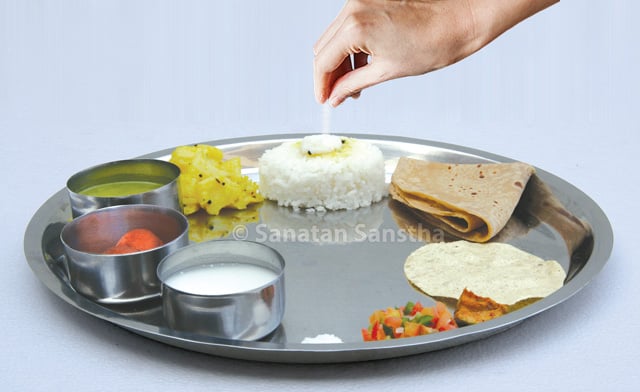Table salt is one of the most important ingredients in cooking. Though salt less food is tasteless food, following points will explain why use of salt should be restricted.

1. Do not serve salt on the palm and eat
‘Table salt is considered Raja–Tama-predominant. When table salt is taken on the palm, the rapidly functioning Raja component waves in it dissipate into the body and help the Tama component to congregate in the body; hence, taking table salt on the palm and eating is considered inappropriate.
2. Add table salt just sufficient to improve the taste
By adding table salt just sufficient to improve the taste of a dish, care is taken to restrict the Raja–Tama components in them from functioning with the help of other food ingredients.
3. Avoid excessive consumption of table salt
Due to excessive consumption of table salt, the Raja–Tama-predominant waves remain in a congregated state in the body and form centres at respective places. Subsequently, negative energies dwell in these centres. Therefore, avoid excessive use of table salt in meals.’ – H.H. [Mrs] Anjali Gadgil,
4. Why one should not exchange items
such as table salt and old curds at night?
‘Night is considered an inauspicious period by Dharma due to Raja–Tama-predominant environment. Exchange of any Raja–Tama-predominant items during this period is prohibited; for, nights being conducive to Raja–Tama-predominant exchange, there is a strong possibility of obstruction by negative energies in every act and also of negative energies from one house entering the other through the medium of such items. Generally, an utara of salt, bhakri (A type of Bharatiya bread), buttermilk or any sour item is given for attracting the inferior level negative energies. This is called ‘white utara’. Therefore, do not perform an inauspicious act of exchanging items such as salt and old curds at night.’ – H.H. [Mrs] Anjali Gadgil
Reference : Sanatan’s Holy Text Components required for cooking a meal

